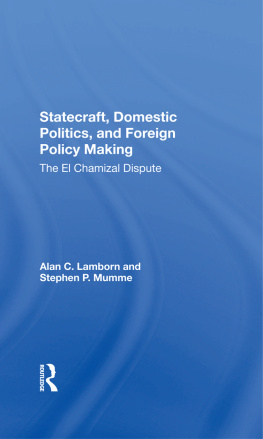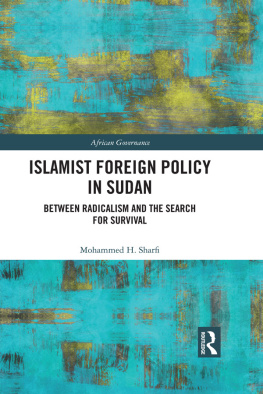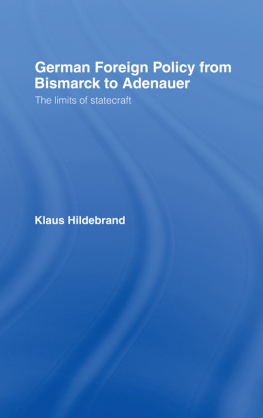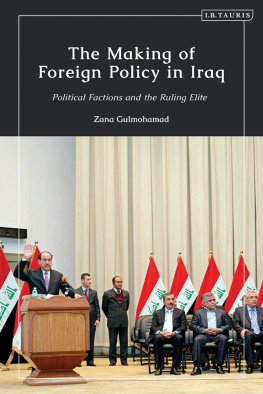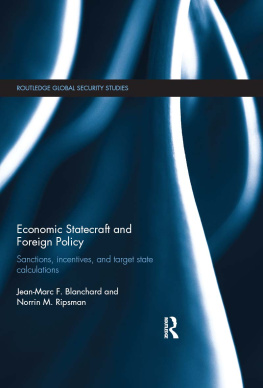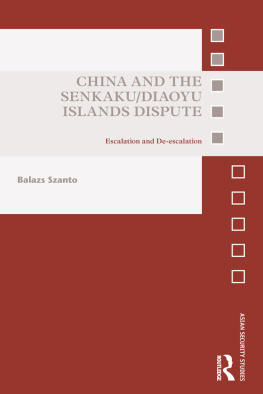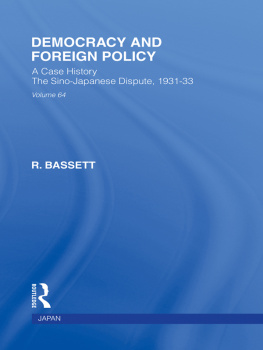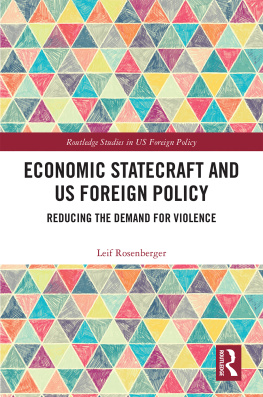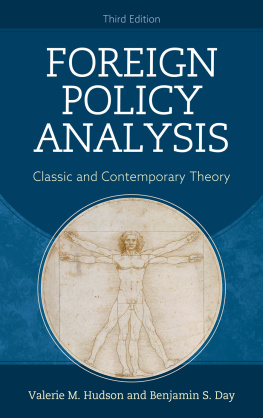Statecraft, Domestic Politics, and Foreign Policy Making
Statecraft, Domestic Politics, and Foreign Policy Making
The El Chamizal Dispute
Alan C. Lamborn
and Stephen P. Mumme
First published 1988 by Westview Press, Inc.
Published 2019 by Routledge
52 Vanderbilt Avenue, New York, NY 10017
2 Park Square, Milton Park, Abingdon, Oxon OX14 4RN
Routledge is an imprint of the Taylor & Francis Group, an informa business
Copyright 1988 Taylor & Francis
All rights reserved. No part of this book may be reprinted or reproduced or utilised in any form or by any electronic, mechanical, or other means, now known or hereafter invented, including photocopying and recording, or in any information storage or retrieval system, without permission in writing from the publishers.
Notice:
Product or corporate names may be trademarks or registered trademarks, and are used only for identification and explanation without intent to infringe.
Library of Congress Cataloging-in-Publication Data
Lamborn, Alan C.
Statecraft, domestic politics, and foreign policy making.
(Westview special studies in international relations)
Bibliography: p.
Includes index.
1. El Chamizal (Mexico and Tex.). 2. United StatesBoundariesMexico. 3. MexicoBoundariesUnited States. I. Mumme, Stephen P. II. Title. III. Series.
F786.L28 1988 353.0089 86-34025
ISBN 13: 978-0-367-28876-1 (hbk)
Dedicated to
A.F.K. ORGANSKI and EDWARD J. WILLIAMS
for their contribution to the understanding of the linkages between domestic and international politics
During the course of our research and writing we have benefited from the help of many individuals and several institutions. An internship sponsored by the Overseas Development Council and the Latin American Program of the Woodrow Wilson International Center for Scholars at the Smithsonian Institution enabled Mumme to collect much of the archival data on the Truman administration from the United States National Archives and to interview personnel at the State Department in 1980. Ms. Sally Marks, Director of the Diplomatic Branch of the National Archives, was very helpful in running down leads and answering numerous questions. Mr. T.R. Martin, Liaison Officer with the International Boundary and Water Commission (IBWC), Mr. Robert Ybarra, Secretary with the IBWC, and Mr. Nestor Valencia, Director of Planning of the city of El Paso, graciously consented to long and useful interviews. More recently, a John Stern faculty research grant from the College of Arts, Humanities, and Social Sciences at Colorado State University facilitated the acquisition of documents on the Eisenhower years and helped defray the costs of preparing the final manuscript for publication.
We would also like to thank a number of individuals for taking the time to review materials from the manuscript. At the International Boundary and Water Commission, both Commissioner Joseph F. Friedkin and Robert Ybarra read and commented on papers later incorporated into the manuscript. Retired Ambassador Frank V. Ortiz read and commented on an early draft of the entire manuscript, as did an anonymous reviewer for Westview Press. Finally, our particular thanks to several colleagues who patiently and thoughtfully responded to repeated requests for their criticisms and suggestions at various stages of the writing: Bruce Bueno de Mesquita, Michael Sullivan, James Lehman, Francis A. Beer, Helen Ingram, Michael Meyer, Valerie J. Assetto, and John Vloyantes. The responsibility for any errors that remain rests, of course, with us.
Alan C. Lamborn
Stephen P. Mumme
The El Chamizal dispute was the most significant territorial controversy between the United States and Mexico in the twentieth century and remains a key case in international law. The dispute began in 1911, when the United States rejected an arbitral decision adjudicating territorial claims contesting a tract of land, the El Chamizal, located between the cities of El Paso, Texas, and Cd. Jurez, Chihuahua. The ensuing diplomatic conflict was not resolved until the Kennedy administration, During the intervening fifty-two years half a dozen United States administrations had tried and failed to get out from under what had become one of the most celebrated territorial issues in the hemisphere.
Why did Kennedy succeed when so many others had tried and failed? The significance of the controversy has generated numerous articles, several monographs, and a book-length interpretation of the dispute based on the available diplomatic history and legal scholarship. Given the intensity of the controversy, there is a remarkable consensus on why it was finally resolved. Put simply, the consensus is that changes in the diplomatic situations of both countries encouraged the two governments to compromise on the remaining substantive differences and reach a settlement that served the interests of each. It is a classic "statecraft" interpretation; it is also fundamentally flawed, both historically and theoretically.
The conventional interpretation is flawed historically because it is based on archival research only through 1940, even though the settlement occurred in 1963. Because there was a strong public record of negotiations during the Kennedy administration, the absence of archival research on the years after 1940 had not seemed a critical problem. However, the release of new archival documents on the Roosevelt, Truman, and Eisenhower administrations reveals the need for a radical revision of the conventional historical record prior to the Kennedy years. The most significant revelation is the existence of several previously secret attempts by Truman to settle the dispute.
These "Truman Rounds" are significant theoretically as well as historically. They are significant because they reveal that the same diplomatic incentivesthe same considerations of statecraftwhich are used by scholars to explain the settlement under Kennedy were present, recognized, and pursued under Truman. Clearly something is missing. Fortunately, a theoretically informed reading of the archives provides those missing pieces. Kennedy built a coalition within the government, and between Washington and key actors in Texas, that could sustain his strategic initiative; Truman was not able to get the key domestic factions on board.
A formidable number of domestic factions had to be on board to consummate presidential policy initiatives in this dispute. At the local level there was the city of El Paso and the Texas Congressional delegation. At a more intermediate level there was a highly unusual, quasi-autonomous diplomatic agency headquartered in El Paso, the International Boundary and Water Commission (the IBWC). In Washington the president had to contend with the State Department and its subsidiary agencies: the Bureau of Inter-American Affairs, the Office of Middle American Affairs, and the Division of Mexican Affairs. It was quite a disparate group, each with different agendas, each with a different role to play in the incremental sequence of policy making, and each with different sources of influence over the shape of the outcome. It is, of course, exactly that variety which makes policy making in the El Chamizal dispute such a useful vehicle for analyzing coalition building. First, however, we need to know what we are looking for in the historical record. We need, in short, a theoretical perspective that integrates statecraft, with its traditional emphasis on the interstate strategic context, with an analysis of domestic coalition building.

